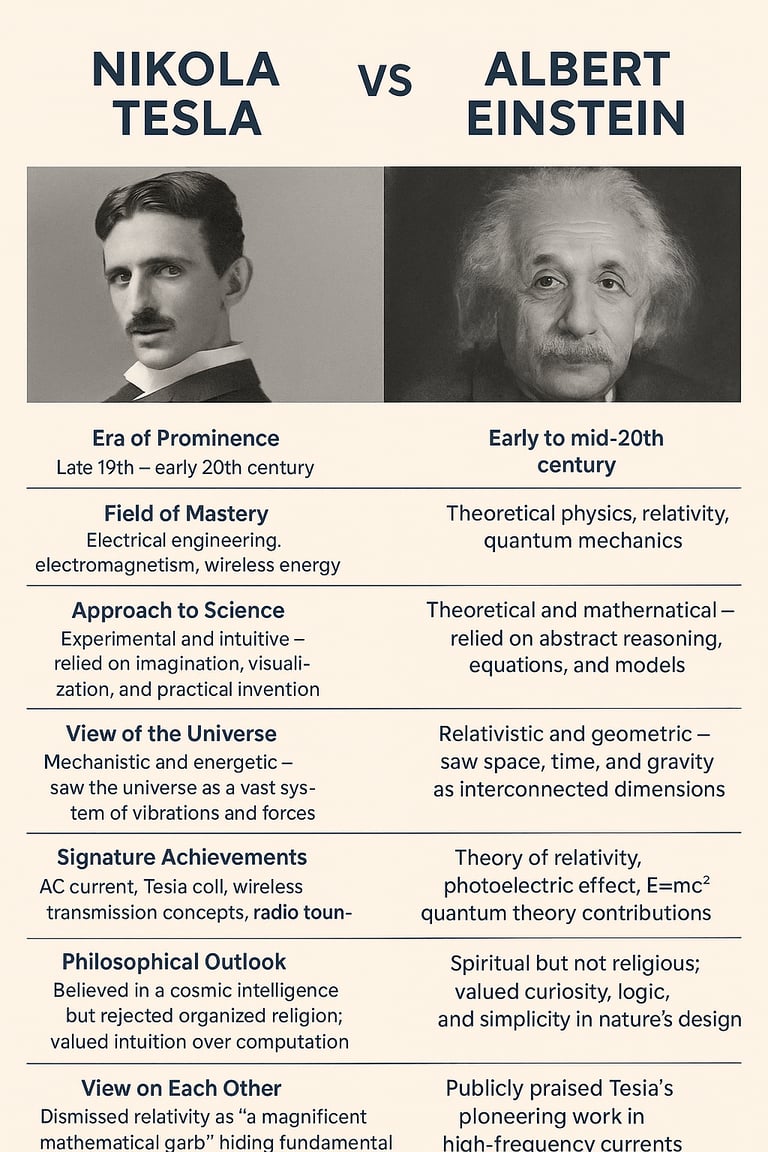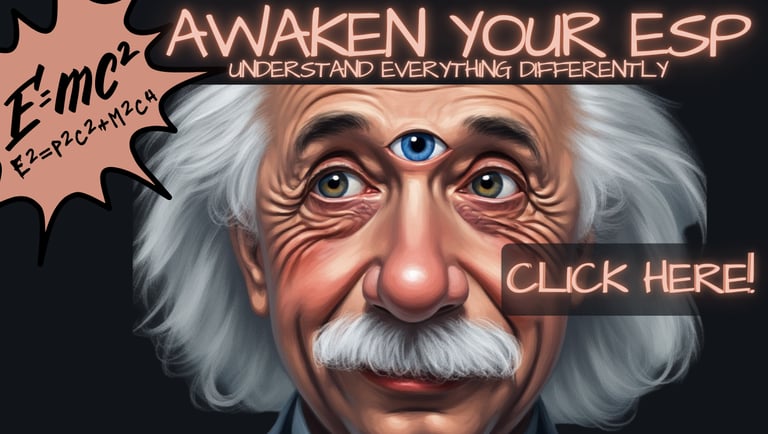Tesla and Einstein - The Magus and Virtuoso
Einstein and Tesla — two brilliant minds bound by mutual respect but divided by science. Learn how Einstein praised Tesla’s innovations even as Tesla fiercely rejected Einstein’s theory of relativity and their opposing views of the universe.
TESLAEINSTEINWARLOCKSENERGIESSCIENTIFICWIZARDS
10/13/20253 min read


Tesla once said,
“My brain is only a receiver; in the Universe there is a core from which we obtain knowledge, strength, and inspiration.”
Think about it: the classic image of a warlock or witchdoctor isn’t just someone who chants incantations — it’s someone who manipulates hidden forces of nature, treating intuition, imagination, and invisible energies as legitimate tools of discovery. Warlocks deciphered patterns invisible to the untrained eye, and whom also use words, symbols, and formulae to bend reality. That’s exactly what Einstein did with mathematics. And what Tesla did with mechanics.
Einstein may have scoffed at mysticism in the supernatural sense, but his work was pure alchemy of intellect. He took invisible, intangible concepts — space, time, energy, gravity — and with a stroke of his symbolic wand (E=mc²), he transmuted the world’s understanding of reality.
That 'flashes of light' statement alone straddles the border between scientific insight and esoteric philosophy. To Tesla, the mystical wasn’t about gods or magic, it was about the unseen mechanisms of reality — frequencies, vibrations, and energy — that science had yet to fully explain. Perhaps Einstein's theories later cemented Teslas stance on his own outlook. Albert and Nikola shared a mutual respect as pioneering minds, yet their relationship was marked by profound philosophical differences. On Tesla’s 75th birthday in 1931, Einstein honored him as “an eminent pioneer in the realm of high-frequency currents,” recognizing his groundbreaking contributions to science and technology.
However, Tesla was openly critical of Einstein’s theory of relativity, dismissing it in 1935 as “a magnificent mathematical garb” that obscured what he saw as fundamental errors about the nature of mass and energy. So, where Einstein approached the universe through mathematics and relativity, Tesla relied on gut intuition and a mechanistic understanding of physical forces.
In the end, while Tesla rejected Einstein’s theoretical abstractions, Einstein admired Tesla’s inventive brilliance. Maybe Einstein was just being cordial, maybe not, but these two geniuses were divided by their visions of how the universe really works.
So in essence:
Tesla rejected mysticism as superstition, but embodied mysticism as revelation — lmao, how else could he have explained his flashing lights?! He had no other reasonable choice. This just may have been what kept him from quitting against constant, unfavorable odds. And yes, just like a suppressed grimoire, many of the deeper implications of Einstein's work — his pursuit of a Unified Field Theory (a sort of “Theory of Everything”) — remain buried, fragmented, or intentionally overshadowed by institutional science. Much like Tesla, he seemed to brush against something too potent and too unprofitable.
The irony?
Einstein rejected mysticism, yet he embodied it. He was a rational magician — a conjurer whose spells took the form of thought experiments rather than incantations. The “smoke and mirrors” wasn’t hocus-pocus; it was relativity, a system so counterintuitive that even seasoned scientists struggled to believe it until proven true. Teslas view, however, was multifaceted.
On one hand, like Einstein, Tesla was a man of science and precision, relentlessly devoted to experimentation and measurable results. However, he openly dismissed organized religion and superstition, calling blind faith a “perversion of reason.” He often emphasized logic, mathematics, and the physical laws of nature as the only true language of the universe. Not exactly an unsound viewpoint.
So, when you line it up:
Einstein’s equations = ancient runes
His theories of relativity = reality-altering spells
Tesla's mechanical mind = the staff through which the invisible is made visible
Their “reservations” about mysticism = the wizard denying his own magic and the sorcerer concocting formulas.
If Tesla was the inventor-mystic — summoning energy from the ether — then Einstein was the intellectual warlock, mastering the language of the universe itself.
Now, on the other hand, his imagination and intuition were profoundly mystical in nature. He believed the universe was a vast, interconnected energy field, and that by tuning one’s mind, one could tap into its secrets — ideas that resonate with both mysticism and metaphysics. I mean, we all know this was a man of exceptional intellect yet we all also know that a little madness comes with the territory. In this instance, he spoke of receiving visions, sudden “flashes of light,” and ideas that came to him fully formed — as if from another realm. Sounds cookoo? Agreed, but this is Tesla, so, imo, he gets a pass.
Thank You for Your patronage.
G8WAY intellectual property found herein is branded as such and most graphic interchange formats along with all links lead to external businesses not owned or operated by G8WAY. If you own any image included here and wish to request its removal or proper attribution, please contact admin@g8way.online or at (610) 600-5437 and G8WAY will respond as promptly as possible. Please note: a page’s presence in G8WAY does not imply it is complete. Each entry is a living document that may be subjected to editorial corrections and/or additions. G8WAY may earn a commission when users make a purchase through links posted throughout this site. Information on WWW.G8WAY.ONLINE is opinionative and for entertainment purposes only and should not be considered professional advice. Thank You for Visiting! G8WAY.ONLINE ©2025 All rights reserved.


